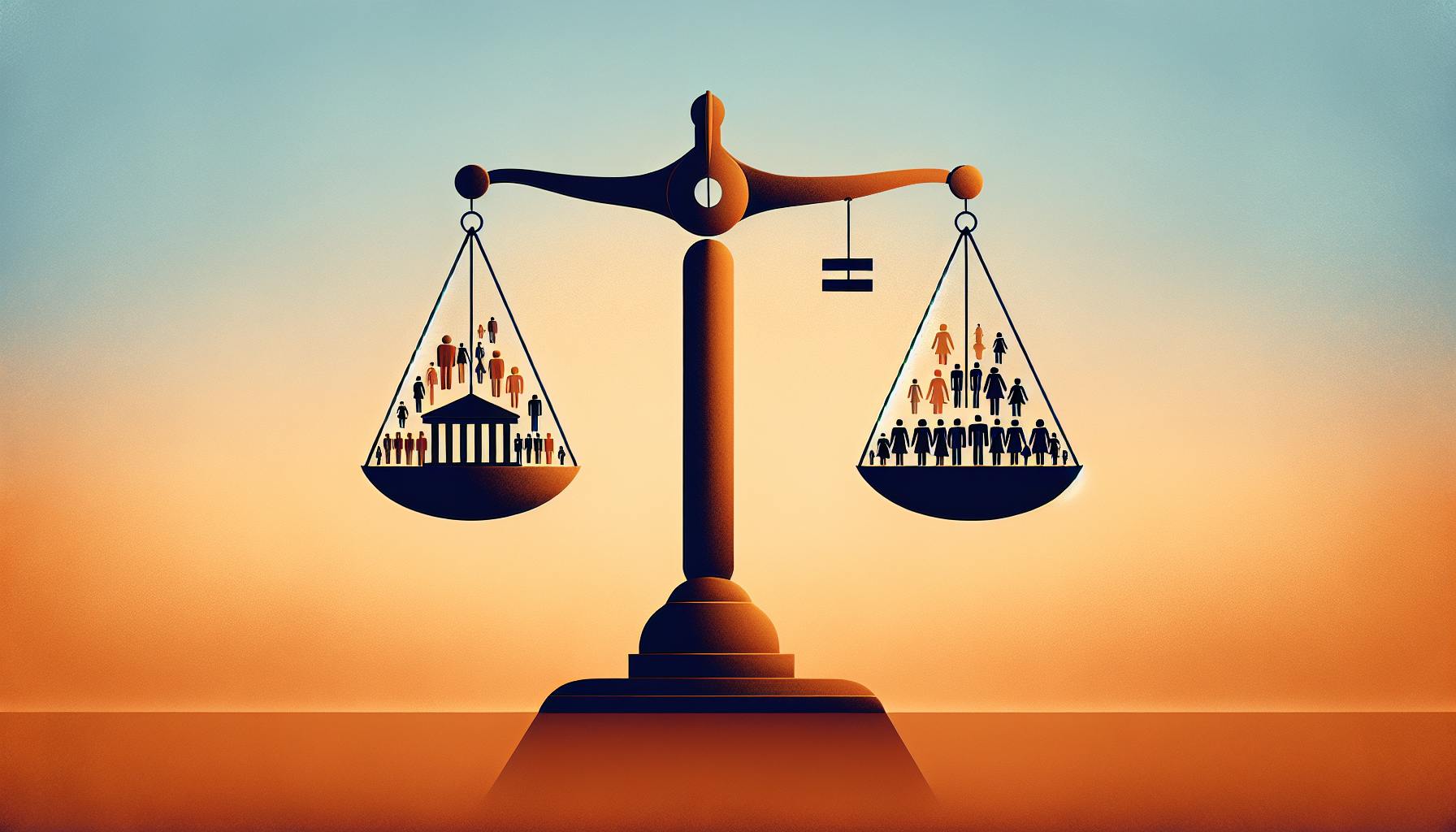Most can agree that denying voting rights is undemocratic.
The 23rd Amendment took a significant step toward greater democracy by extending voting rights to Washington D.C. through the electoral college.
This article will explore the background, provisions, and legacy of the 23rd Amendment's advancement of voting rights for our nation's capital.
Introduction to Voting Rights and the 23rd Amendment
The 23rd Amendment was ratified in 1961 to grant residents of Washington D.C. the right to vote in presidential elections. Prior to this, D.C. residents lacked Congressional representation and the ability to vote for president.
Understanding the District of Columbia's Lack of Representation
Washington D.C. is a federal district under the direct jurisdiction of Congress, rather than a state. As such, D.C. did not have any voting representatives or senators in Congress prior to the 23rd Amendment. Residents also could not vote in presidential elections.
The Push for Electoral Inclusion
In the 19th and early 20th centuries, there were several attempts to pass an amendment to grant D.C. residents the right to vote for president and vice president. However, Southern Democrats in Congress blocked these efforts.
In 1961, the campaign for D.C. voting rights finally succeeded with the ratification of the 23rd Amendment. This marked an important milestone in the fight for electoral inclusion.
Why Was the 23rd Amendment Created?
The 23rd Amendment was created to grant Washington D.C. residents the right to vote for president and vice president. Voting is an essential civil right in a democracy. By ratifying this amendment, Congress affirmed that D.C. residents deserved representation, even if they lacked voting members of Congress.
The 23rd Amendment in Simple Terms
The 23rd Amendment treats D.C. similarly to a state in terms of allotting presidential electors. It grants D.C. as many electors as it would have if it were a state, based on its population. Today, D.C. has three electoral votes in the Electoral College.
What does the 23rd Amendment do for Washington DC?
The 23rd Amendment grants Washington D.C. residents the right to vote in presidential elections. Specifically, it allows the District of Columbia to appoint electors to the Electoral College as if it were a state, based on the number of senators and representatives it would be entitled to if it were a state.
Here are the key details of what the 23rd Amendment does:
-
It grants Washington D.C. 3 electors in the Electoral College for the purpose of electing the President and Vice President. This is equal to the number of electors the least populous state (currently Wyoming) gets.
-
It allows Washington D.C. residents to vote in presidential elections just like citizens of the 50 states. Before this, D.C. residents could not vote for president.
-
The 23rd Amendment was ratified in 1961 after decades of effort by D.C. residents to gain full voting rights and congressional representation.
In short, the main impact of the 23rd Amendment was giving Washington D.C. citizens the right to participate in presidential elections by awarding D.C. electors in the Electoral College. This was an important milestone in the long struggle for D.C. voting rights.
What amendment is DC voting rights?
The District of Columbia Voting Rights Amendment was a proposed amendment to the United States Constitution that would have given Washington, D.C. full congressional voting representation and participation in the Electoral College. However, it failed to be ratified by enough states and did not become part of the Constitution.
Here are some key points about the D.C. Voting Rights Amendment:
-
It was passed by Congress in 1978 and sent to the states for ratification. It would have given D.C. two senators and a number of House representatives based on its population.
-
Supporters argued that over 700,000 D.C. residents deserved full voting rights and representation in Congress like all other Americans. The large African American population in D.C. lacked voting rights.
-
Opponents said that the Constitution never intended for the federal district to have voting members of Congress. Some also worried it would give undue national influence to a single urban area.
-
Only 16 states had ratified the amendment by the 1985 deadline, far short of the 38 states needed. This failure has left Washington D.C. still without full congressional voting rights today.
So in summary, the D.C. Voting Rights Amendment was an unsuccessful attempt to give Washington D.C. residents full participation and representation in Congress through a constitutional amendment. The ongoing lack of voting rights for D.C. remains a controversial issue.
Why were DC residents not allowed to vote before the creation of the amendment?
Since the District of Columbia is not a state, its residents did not have voting representation in Congress or the Electoral College prior to the ratification of the 23rd Amendment. This lack of representation was a consequence of DC's unique status as the seat of the federal government rather than a state.
Specifically:
-
When DC was formed from land ceded by Maryland and Virginia, its residents lost their ability to vote for members of Congress as they were no longer residents of those states.
-
As it is not a state, DC did not have any electoral votes to cast for president.
-
Residents could not vote on Constitutional amendments despite being US citizens.
This disenfranchisement was controversial and not well received by DC residents, who protested for voting rights. But their lack of Congressional representation meant they had little recourse to change the situation prior to the 23rd Amendment.
The 23rd Amendment finally granted DC residents the right to vote for president by awarding the District electoral votes equal to the number it would have if it were a state. This partial enfranchisement addressed the most glaring issue of taxation without representation. However, DC citizens still lack voting members of Congress.
How did the Twenty-Third Amendment affect Washington DC quizlet?
The Twenty-Third Amendment granted Washington, D.C. full participation in presidential elections. Specifically, it gave D.C. residents the right to vote in presidential elections by awarding the District electors in the Electoral College, as if it were a state.
Prior to the ratification of the Twenty-Third Amendment in 1961, residents of Washington, D.C. did not have voting representation in presidential elections. The passage of this amendment enabled D.C. residents to take part in choosing the President and Vice President for the first time in 1964.
Some key effects of the Twenty-Third Amendment on Washington D.C. include:
- Allowed D.C. residents to vote for President and Vice President for the first time beginning in 1964
- Granted the District of Columbia electors in the Electoral College equal to the number of Senators and Representatives it would be entitled to if it were a state, but no more electors than the least populous state
- Currently entitles D.C. to 3 electors in the Electoral College
- Marked increased voting rights and representation for D.C. residents
So in summary, the main impact was granting Washington D.C. full voting rights and representation in presidential elections through the Electoral College system. This was a major step towards increased federal representation and voting equality for District residents.
sbb-itb-e93bf99
sbb-itb-e93bf99
sbb-itb-e93bf99
The Enactment of the 23rd Amendment
The 23rd Amendment was ratified in 1961, granting Washington D.C. residents the right to vote in presidential elections. This gave D.C. electoral college votes proportionate to their population size, enabling them to participate in choosing the President. However, the Amendment did not grant D.C. voting representation in Congress.
Granting Electoral College Votes to D.C.
Prior to the 23rd Amendment, Washington D.C. residents could not vote for president. The Amendment gave D.C. a number of electoral college votes based on their population count. Today D.C. has 3 electoral college votes, allowing D.C. voters to participate in presidential elections.
Understanding the Limitations: Congressional Representation
While the 23rd Amendment enabled D.C. residents to vote for president through the electoral college, it did not grant them voting representation in the House or Senate. D.C. still does not have voting members of Congress, limiting their representation in the national legislature.
What Did the 23rd Amendment Do for D.C. Voters?
For D.C. voters, the 23rd Amendment enabled them to have a voice in choosing the President of the United States. Prior to 1961, they did not have this ability as they lacked electoral college votes. The Amendment brought D.C. voters into the presidential election process by allotting them electoral votes based on population.
Civics in Action: The Implementation of the 23rd Amendment
The ratification of the 23rd Amendment demonstrated civics in action. An injustice was identified in D.C. voters lacking representation in presidential elections. The Constitution was amended through an arduous legislative process to correct this injustice. Since 1961, D.C. voters have participated in U.S. presidential elections, showcasing the power of civic participation in driving political change.
The Road to Ratification
The 23rd Amendment, granting voting rights in presidential elections to residents of Washington D.C., faced a lengthy road to ratification after being proposed in 1960. Despite bipartisan Congressional approval, the amendment met opposition during the state ratification process. Ultimately, after contentious debate, it was officially ratified in 1961.
Bipartisan Congressional Approval
The 23rd Amendment was introduced with broad bipartisan support in Congress. Many representatives felt it was undemocratic to deny District residents the right to vote for president. The amendment passed the House with a vote of 288-127 and the Senate 67-11. This high level of bipartisan consensus propelled it forward to state ratification.
The Ratification Process
Despite Congressional approval, the 23rd Amendment faced greater contention during state ratification. Opponents argued it provided the heavily Democratic District with unjust influence. By March 1961, only 28 states had ratified it, 8 short of the 36 needed. To build momentum, ratification advocates campaigned state-by-state, arguing voting rights were fundamental in a democracy. On March 29, 1961, enough states finally ratified to make it law.
The National Archives: 23rd Amendment Ratification
The National Archives holds original documentation of each state's ratification vote for the 23rd Amendment. These formal ratifications, signed by governors or state legislators, represent official state approval of the amendment as federal law. The documents provide insight into the specific timeline and complex political dynamics surrounding the ratification process.
CRS Annotated Constitution: 23rd Amendment Analysis
The Congressional Research Service's annotations provide valuable legal and historical analysis of the 23rd Amendment's origins and effects. They examine the motivations behind the amendment, arguments made during the ratification debate, and subsequent impact on presidential elections. As a trusted nonpartisan source, the CRS offers an authoritative academic perspective on this complex, highly-contested amendment.
The 23rd Amendment's Impact and Importance
The 23rd Amendment has had a significant impact on Washington D.C. residents and presidential elections since its ratification in 1961. By granting D.C. residents the right to vote in presidential elections, the amendment helped empower a disenfranchised population and brought them into the democratic process.
The First Presidential Vote in D.C.
In 1964, Washington D.C. participated in a presidential election for the first time following the 23rd Amendment's ratification. Lyndon B. Johnson carried D.C. with over 85% of the vote against Barry Goldwater. The election marked a milestone for D.C. residents finally being able to have their voices heard in choosing the President.
Why is the 23rd Amendment Important?
The 23rd Amendment is important because it gave Washington D.C. residents the right to vote for President, a basic democratic right that state residents had enjoyed. While limitations remain with D.C.'s lack of voting representation in Congress, the amendment was an important first step in empowering D.C. voters.
Influence on the Democratic Party and African-Americans
The 23rd Amendment has strengthened the Democratic Party's dominance in D.C. politics. With a large African-American population, D.C. votes overwhelmingly Democratic in national elections. This concentrates more Democratic votes into D.C.'s 3 electoral votes, influencing presidential campaigns to court African-American voters.
The Ongoing Relevance of the 23rd Amendment in Elections
Despite its age, the 23rd Amendment remains highly relevant in modern presidential elections. D.C.'s electoral votes remain coveted by both parties. Issues like potential D.C. statehood keep the amendment significant as a foundation for D.C.'s participation in national elections.
Continuing the Fight for Full Representation
After the ratification of the 23rd Amendment granting Washington D.C. residents the right to vote for president, efforts continued to try to gain full congressional representation and self-governance for the district. However, the path has not been straightforward.
The Quest for Statehood
There have been various proposals introduced in Congress to grant statehood to Washington D.C., which would give residents full voting rights and representation in Congress. However, these have faced significant opposition from those concerned about the political implications of adding reliably Democratic seats. Constitutional concerns have also been raised.
Proposed Amendments for Congressional Representation
An alternative approach has been proposed constitutional amendments that would grant Washington D.C. two voting Senators and one voting House representative, without making it a state. But these have also faced political and legal uncertainties.
Evolving Amendments to the United States Constitution
The ongoing push for D.C. voting rights and representation reflects broader trends regarding amending the Constitution - it is rare and difficult, but views can shift over time. As American democracy evolves, support continues to grow for granting full rights to Washingtonians.
The Debate Over Expanding Voting Rights for Washington D.C.
Views remain mixed on whether and how to expand federal representation and self-governance for D.C. Supporters argue taxation without representation is unfair and undemocratic. Opponents cite concerns about upsetting the balance of federal power. The debates are likely to continue even with the milestone 23rd Amendment.
Conclusion: Reflecting on the Legacy of the 23rd Amendment
The 23rd Amendment secured a long-overdue right for Washington D.C. residents - the right to participate in presidential elections. By granting Washington D.C. voters representation in the electoral college, the amendment affirmed core principles of democracy and representation.
Reaffirming the Core Achievements
The 23rd Amendment was a milestone in the journey towards full democratic participation. It enabled Washington D.C. residents to have a voice in choosing the President, bringing them one step closer to equal standing with voters in the 50 states. This reaffirmed fundamental ideas in America's founding documents.
The Unfinished Journey of Representation
However, Washington D.C. residents still lack voting representation in Congress. So while presidential election rights were achieved, the fight continues for full Congressional representation and potential statehood. The 23rd Amendment was an important step, but not the final one.
The 23rd Amendment in the Broader Context of Government and Democracy
Ultimately, the 23rd Amendment demonstrated how the Constitution can evolve to expand rights over time. As American democracy progresses, amendments like this move us towards the ideal of government of, by, and for the people. The legacy of the 23rd Amendment is tied to this ongoing journey of perfecting democracy and representation.


